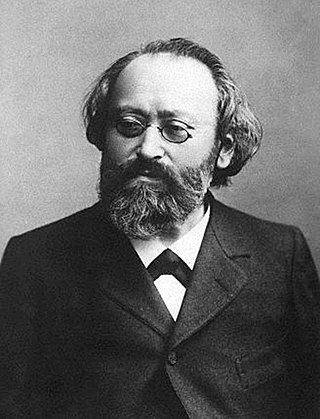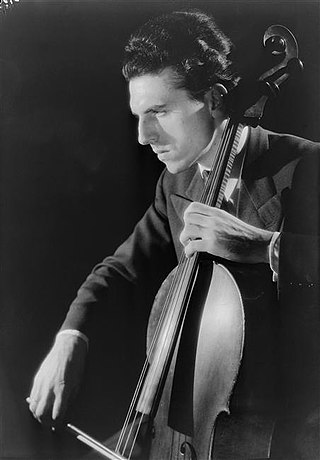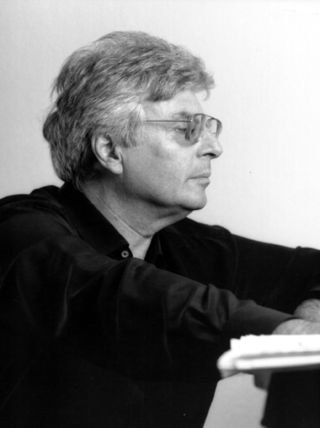Related Research Articles

The violoncello ( VY-ə-lən-CHEL-oh, Italian pronunciation:[vjolonˈtʃɛllo]), normally simply abbreviated as cello ( CHEL-oh), is a middle pitched bowed (sometimes plucked and occasionally hit) string instrument of the violin family. Its four strings are usually tuned in perfect fifths: from low to high, C2, G2, D3 and A3. The viola's four strings are each an octave higher. Music for the cello is generally written in the bass clef, tenor clef, alto clef and treble clef used for higher-range passages.

Max Bruch was a German Romantic composer, violinist, teacher, and conductor who wrote more than 200 works, including three violin concertos, the first of which has become a staple of the violin repertoire.

Paul Tortelier was a French cellist and composer. After an outstanding student career at the Conservatoire de Paris he played in orchestras in France and the US before the Second World War. After the war he became a well-known soloist, playing in countries round the globe. He taught at conservatoires in France, Germany and China, and gave televised masterclasses in England. He was particularly associated with the solo part in Richard Strauss's Don Quixote, cello concertos by Elgar and others, and Bach's Cello Suites.

The Brandenburg Concertos by Johann Sebastian Bach are a collection of six instrumental works presented by Bach to Christian Ludwig, Margrave of Brandenburg-Schwedt, in 1721. The original French title is Six Concerts Avec plusieurs instruments, meaning "Six Concertos for several instruments". Some of the pieces feature several solo instruments in combination. They are widely regarded as some of the greatest orchestral compositions of the Baroque era.

David Geringas is a Lithuanian cellist and conductor who studied under Mstislav Rostropovich. In 1970 he won the gold medal at the International Tchaikovsky Competition. He also plays the baryton, a rare instrument associated with music of Joseph Haydn.
Lillian Fuchs was an American violist, teacher and composer. She is considered to be among the finest instrumentalists of her time. She came from a musical family, and her brothers, Joseph Fuchs, a violinist, and Harry Fuchs, a cellist, performed with her on various recordings.

Josef Fiala, was a Czech composer, oboist, viola da gamba virtuoso, cellist, and pedagogue of the Classical period.

Mats Lidström is a Swedish solo cellist, recording artist, chamber musician, composer, teacher and publisher.
Nathaniel "Nick" Rosen is an American cellist, the gold medalist of the 1978 International Tchaikovsky Competition, and former faculty member at the USC Thornton School of Music and the Manhattan School of Music.
Fritz Geißler (or Geissler) was one of the most important composers of the German Democratic Republic.
Tsuyoshi Tsutsumi is a world renowned Japanese cellist. In an international career which began in 1954, Tsutsumi has performed and recorded all of the principal standard works in the cello repertoire, both solo and concerto. He has appeared as soloist with the Vienna Philharmonic Orchestra, the Royal Concertgebouw Orchestra of Amsterdam, the Leipzig Gewandhaus Orchestra, the London Symphony Orchestra, the Chicago Symphony Orchestra, the Boston Symphony Orchestra, and the National Symphony Orchestra of Washington D.C..

Friedrich Wilhelm Ludwig Grützmacher was a German cellist and composer in the second half of the 19th century. He composed mostly for cello, but also wrote orchestral pieces, chamber music, piano music and songs.

Bruno Mantovani is a French composer. He has been awarded first prizes from the Conservatoire de Paris which he joined in 1993. His work has been commissioned by the French government as well as other organizations. In September 2010 he was appointed to the post of director of the Paris Conservatory.

Kenneth Slowik is an American cellist, viol player, and conductor. Curator of Musical Instrument Collection at the National Museum of American History and Artistic Director of the Smithsonian Chamber Music Society. He took an interest in music and organology from an early age. He studied at the University of Chicago, the Chicago Musical College, the Peabody Conservatory, the Salzburg Mozarteum and, as a Fulbright Scholar, the Vienna Hochschule für Musik, guided by Howard Mayer Brown, Nikolaus Harnoncourt, Antonio Janigro, Edward Lowinsky, and Frederik Prausnitz.

Graham Waterhouse is an English composer and cellist who specializes in chamber music. He has composed a cello concerto, Three Pieces for Solo Cello and Variations for Cello Solo for his own instrument, and string quartets and compositions that juxtapose a quartet with a solo instrument, including Piccolo Quintet, Bassoon Quintet and the piano quintet Rhapsodie Macabre. He has set poetry for speaking voice and cello, such as Der Handschuh, and has written song cycles. His compositions reflect the individual capacity and character of players and instruments, from the piccolo to the contrabassoon.
Erich Urbanner is an Austrian composer and teacher.

|

Frank Michael Beyer was a German composer.

Wolfgang Boettcher was a German classical cellist and academic teacher. He was principal cellist of the Berlin Philharmonic, and a founding member of The 12 Cellists of the Berlin Philharmonic. From 1976, he was professor at the Hochschule für Musik Berlin. From 1986 to 1992 he was artistic director of the Sommerliche Musiktage Hitzacker chamber music festival.
Wolfgang Marschner was a German violinist, teacher of violin, composer and conductor. He was concertmaster of the WDR Sinfonieorchester Köln, and instrumental in world premieres of contemporary music. He was professor at the Folkwang-Hochschule Essen, the Musikhochschule Köln, the Tokyo University of Fine Arts and Music and, for more than three decades, at the Hochschule für Musik Freiburg. He also taught at the Darmstädter Ferienkurse.
References
- ↑ "News Wolfgang Boettcher, principal cellist of the Berlin Philharmonic under Herbert von Karajan, has died". thestrad.com. Retrieved 1 February 2024.